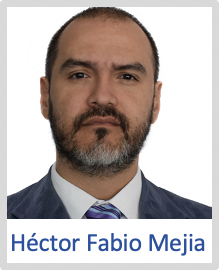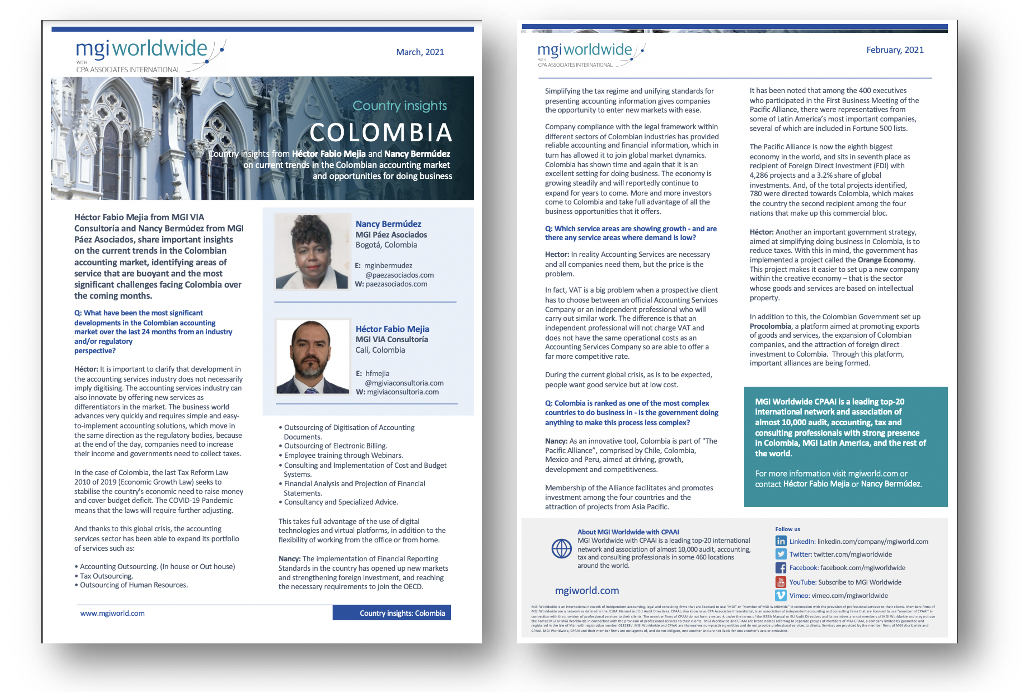Country insights: Colombia – MGI Latin America member firms in Bogotá and Cali share insights on the Colombian accounting profession and the benefits of being part of a global network
In this Country Insight, MGI Worldwide CPAAI accountancy network member Héctor Fabio Mejia, from MGI VIA Consultoría, and Nancy Bermúdez, from MGI Páez Asociados, share important insights on the current trends in the Colombian accounting market, identifying areas of service that are buoyant and the most significant challenges facing Colombia over the coming months.
Q: What have been the most significant developments in the Colombian accounting market over the last 24 months from an industry and/or regulatory perspective?
Héctor: It is important to clarify that development in the accounting services industry does not necessarily imply digitising. The accounting services industry can also innovate by offering new services as differentiators in the market. The business world advances very quickly and requires simple and easy to implement accounting solutions, which move in the same direction as the regulatory bodies, because at the end of the day, companies need to increase their income and governments need to collect taxes.
In the case of Colombia, the last Tax Reform Law 2010 of 2019 (Economic Growth Law) seeks to stabilise the country's economic need to raise money and cover budget deficit. The COVID 19 Pandemic means that the laws will require further adjusting.
 And thanks to this global crisis, the accounting services sector has been able to expand its portfolio of services such as:
And thanks to this global crisis, the accounting services sector has been able to expand its portfolio of services such as:
- Accounting Outsourcing. (In house or Out house)
- Tax Outsourcing.
- Outsourcing of Human Resources.
- Outsourcing of Digitisation of Accounting Documents
- Outsourcing of Electronic Billing.
- Employee training through Webinars.
- Consulting and Implementation of Cost and Budget Systems.
- Financial Analysis and Projection of Financial Statements.
- Consultancy and Specialised Advice.
This takes full advantage of the use of digital technologies and virtual platforms, in addition to the flexibility of working from the office or from home.
 Nancy: The implementation of Financial Reporting Standards in the country has opened up new markets and strengthening foreign investment, and reaching the necessary requirements to join the OECD.
Nancy: The implementation of Financial Reporting Standards in the country has opened up new markets and strengthening foreign investment, and reaching the necessary requirements to join the OECD.
Simplifying the tax regime and unifying standards for presenting accounting information gives companies the opportunity to enter new markets with ease.
Company compliance with the legal framework within different sectors of Colombian industries has provided reliable accounting and financial information, which in turn has allowed it to join global market dynamics. Colombia has shown time and again that it is an excellent setting for doing business. The economy is growing steadily and will reportedly continue to expand for years to come. More and more investors come to Colombia and take full advantage of all the business opportunities that it offers.
Q: Which service areas are showing growth - and are there any service areas where demand is low?
Hector: In reality Accounting Services are necessary and all companies need them, but the price is the problem.
In fact, VAT is a big problem when a prospective client has to choose between an official Accounting Services Company or an independent professional who will carry out similar work. The difference is that an independent professional will not charge VAT and does not have the same operational costs as an Accounting Services Company, so are able to offer a far more competitive rate.
During the current global crisis, as is to be expected, people want good service but at low cost.
Q: Colombia is ranked as one of the most complex countries to do business in - is the government doing anything to make this process less complex?
Nancy: As an innovative tool, Colombia is part of "The Pacific Alliance”, comprised by Chile, Colombia, Mexico and Peru, aimed at driving, growth, development and competitiveness.
Membership of the Alliance facilitates and promotes investment among the four countries and the attraction of projects from Asia Pacific.
It has been noted that among the 400 executives who participated in the First Business Meeting of the Pacific Alliance, there were representatives from some of Latin America’s most important companies, several of which are included in Fortune 500 lists.
The Pacific Alliance is now the eighth biggest economy in the world, and sits in seventh place as recipient of Foreign Direct Investment (FDI) with 4,286 projects and a 3.2% share of global investments. And, of the total projects identified, 780 were directed towards Colombia, which makes the country the second recipient among the four nations that make up this commercial block.
Héctor: Another an important government strategy, aimed at simplifying doing business in Colombia, is to reduce taxes. With this in mind, the government has implemented a project called the Orange Economy. This project makes it easier to set up a new company within the creative economy – that is the sector whose goods and services are based on intellectual property.
In addition to this, the Colombian Government set up Procolombia, a platform aimed at promoting exports of goods and services, the expansion of Colombian companies, and the attraction of foreign direct investment to Colombia. Through this platform, important alliances are being formed.
Click HERE to view the full Country Insight
MGI VIA Consultoría and MGI Páez Asociados are both members of MGI Worldwide CPAAI. For further information contact:
MGI VIA Consultoría - profile page HERE and firm website HERE.
MGI Páez Asociados - profile page HERE and firm website HERE.
MGI Latin America is part of MGI Worldwide with CPAAI, a top 20 ranked global accounting network and association with almost 10,000 independent auditors, accountants and tax experts in some 460 locations in over 100 countries around the world.

